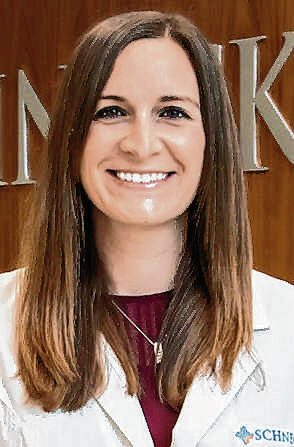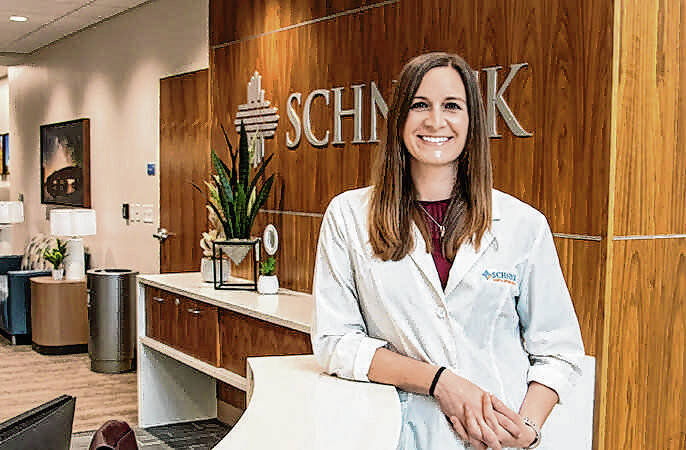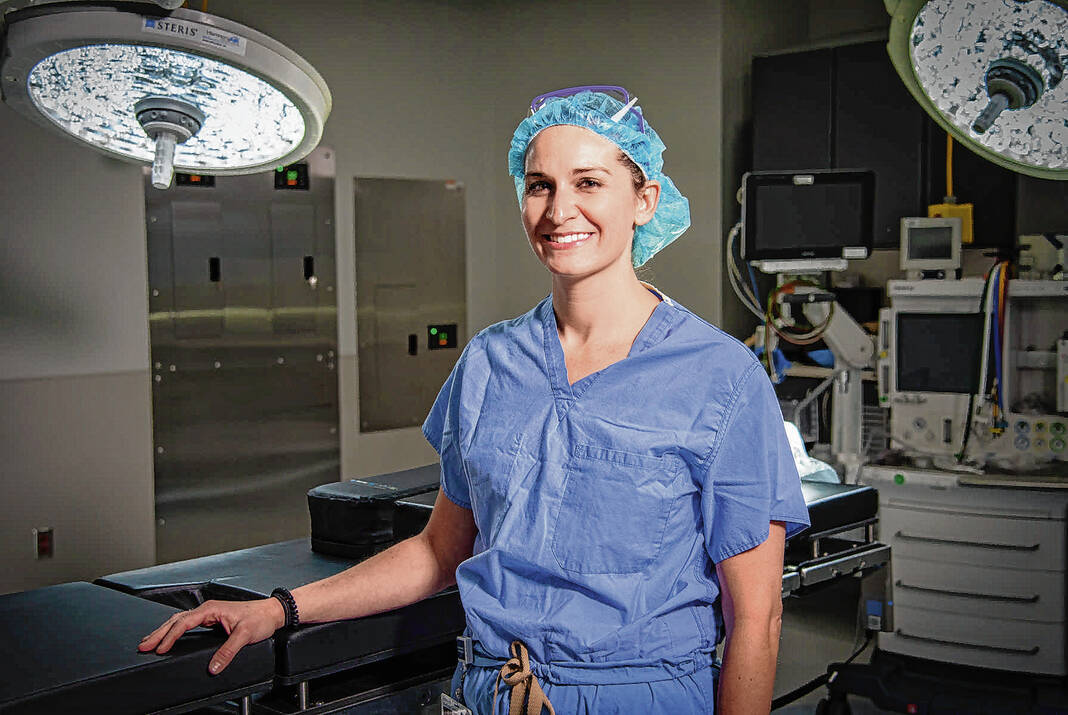A patient has gallstones that have gotten out of the gallbladder and into the common bile duct.
In the past, they would have had to undergo a very invasive surgery to get those stones out, including leaving a drain in to allow appropriate healing.
Nowadays, they can undergo a procedure known as endoscopic retrograde cholangiopancreatography, where the surgeon goes down through the mouth to fish the stones out of the bile duct and doesn’t do any incisions on the exterior of the body.
It had been quite some time that Schneck Medical Center in Seymour had a surgeon who could do ERCP, a state-of-the-art technique used to diagnose and treat problems in the liver, gallbladder and pancreas.
Since August 2022, Dr. Susan Maurer has been with Schneck Surgical Associates, and she is a board-certified surgeon fellowship trained in minimally invasive surgery and advanced endoscopy, including ERCP.
Patients no longer have to be sent to Columbus, Indianapolis or Louisville for the procedure.
“The reason that this is nice to be able to do as a surgeon is because a lot of times, we’re taking out these people’s gallbladders so that they don’t develop stones again,” Maurer said.
While it’s common for people to have their gallbladder removed, she said having stones get out of the gallbladder and into the bile duct is less common.
Disease entities that result in a person needing their gallbladder removed include stones that cause problems or gallbladders that don’t function as well as they used to and cause pain and symptoms, she said. Then people can develop an acute infection of the gallbladder.
“It’s not usually anything that anyone has done to cause it,” she said. “Typically, it’s stones that cause people to have problems, and the stones develop when there’s an imbalance of the things that make up the bile, so it’s really more genetics than anything that you do.”
ERCP also is used for people who have bile duct obstructions that are not stone-related or who have pancreatic cancer.
Maurer said most of her patients come from the emergency room, but she’ll occasionally see someone in her office who needs to have the ERCP procedure.
She said she can do some small office procedures, but if it involves anesthetics, it’s done in the operating room. The procedure can take anywhere from 15 minutes to a couple of hours.
“A lot of it has to do with the patient’s individual anatomy and how difficult it is to get into the bile duct. Then a little bit as to what you’re actually doing,” she said.
“Once we get into the bile duct, we shoot some contrast dye up into the biliary system to light it up and use X-ray to look at what’s going on. Then if we’re doing stone disease, we use wires and balloons to fish the stones out,” she said. “If we’re dealing with a more chronic obstruction, like pancreatic cancer or something, then we’re putting stents in. Occasionally, we have bile leaks from gallbladder surgery from cholecystectomy and we’ll put in a temporary stent.”
One of the benefits of ERCP is it can be done under one anesthesia, Maurer said.
“I can do someone’s ERCP and then myself or one of my partners can come in and take out that patient’s gallbladder without having multiple procedures,” she said, noting if a gastroenterologist is involved, it could take multiple procedures.
“The reason that this is nice to be able to do as a surgeon is because a lot of times, we’re taking out these people’s gallbladders so that they don’t develop stones again,” she said.
Maurer is unique in the fact that during her residency, she trained under two surgeons who did ERCP, and one was trained under a surgeon who developed another type of minimally invasive flexible endoscope procedure that general surgeons often do.
Maurer has been practicing ERCP after completing her fellowship in 2019.
The Westerville, Ohio, native said she initially went into college thinking she would pursue a career in research, but after working in a lab one summer, she changed her mind.
“I had a number of friends that were planning to go to med school, so I decided I would look into that a little bit more and decided ‘Yeah, I think that this is something I could do,’” Maurer said.
Her grandfather was a physician who went to Indiana University School of Medicine after World War II, and her father and aunt also went to IU, so she followed in their footsteps by applying and being accepted.
Maurer earned a bachelor’s degree in biochemistry and biology in 2009 from the Bloomington campus and then went to the IU School of Medicine in Indianapolis, where she earned a Doctor of Medicine degree in 2013.
Next was residency through Southern Illinois University School of Medicine in Springfield, Illinois, which she did for five years at a hospital in her specialty area, general surgery.
“It’s not strictly classes. We had a half-day a week where we did didactics, where we were learning things and we did skills labs to learn some more of the hands-on things,” Maurer said. “Then it’s pretty much independent study. We would go to various conferences, too, to discuss different patient issues and that kind of thing.”
During that time, Maurer got to do surgeries with supervision.
“That’s where we learn to actually do the surgery so that when you’re done, you can go out and practice surgery on your own,” she said. “You’re still learning. We still have a yearly in-service exam that we have to take, but you’re taking care of patients, and for general surgery, we’re operating and things like that.”
Maurer said she was drawn to general surgery because she’s more of a hands-on type of person and more of a doer than a thinker.
“There are plenty of medical specialties where you sit and think about things, and then there are more technical type specialties where you’re working with your hands and you certainly have to think about things and make decisions and things like that, so I decided that I was definitely a doer,” she said.
“I liked that you were really making a difference in patients’ lives, and if I was undecided at the end of five years, there are multiple different specialties that you can go into from general surgery,” she said.
To further specialize in her training, Maurer completed a one-year fellowship in advanced therapeutic endoscopy and gastrointestinal surgery at Ohio State University Wexner Medical Center in Columbus, Ohio.
“This is helpful if you wanted to find a niche,” she said. “I did this because I wanted to learn ERCP.”
After practicing ERCP for a while, Maurer said she began looking for another job and found on a job board that Schneck was looking for a general surgeon. Her being able to do ERCP was an added bonus.
“What I really like is that it’s really more of a community,” she said of Schneck. “All of the physicians really work together well. They communicate with each other. If you’re at a big academic center, that doesn’t always happen. I just like that the administration is so approachable. At a big academic center, that doesn’t really happen. There’s a lot of hierarchy in the way that things are done. Here, if you want something to change, it’s very easy to talk to someone.”
At a glance
Dr. Susan Maurer is with Schneck Surgical Associates.
Her office is located on Level 5 of the Schneck Professional Building, 411 W. Tipton St., Seymour.
For information, call 812-519-2388.



